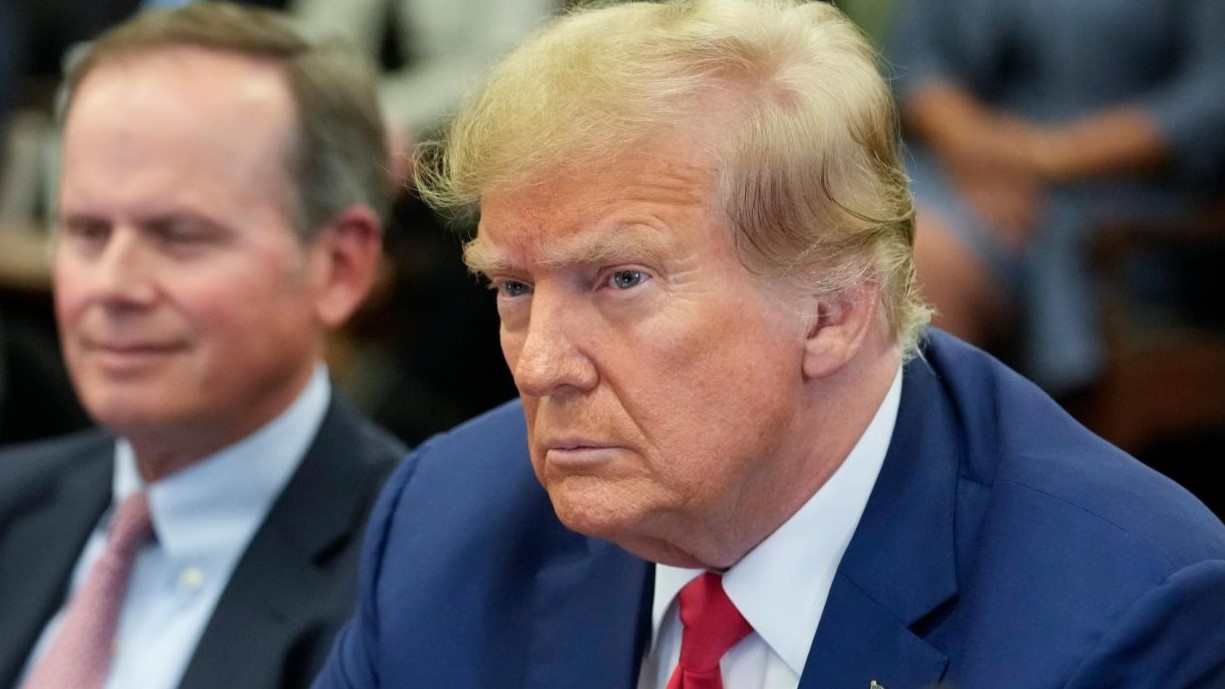
Other voices: Better that voters reject Trumpism than judges do it for them. But …
CHICAGO — Excising Donald Trump’s cancerous affect on our democracy should be up to the voters, not the courts. After all, what better way to repudiate someone — or a movement — espousing plainly anti-democratic values and policies than through the ballot box?
Yet Trump keeps making it more difficult to justify even allowing him to run again for president. The latest example hits close to home. Unlike the previous two times Trump ran for the highest office in the land, he’s apparently refusing this time around to sign a customary pledge in Illinois to refrain from urging the overthrow of the government.
The story, broken by WBEZ and the Chicago Sun-Times, highlights a peculiar vestige of the McCarthy era. Illinois at that time began asking those running for office to sign this loyalty oath. The courts since have ruled the pledge an unconstitutional infringement on free speech, but the state has continued to ask candidates to sign it voluntarily.
Other candidates, including Florida’s Ron DeSantis, have made that simple pledge. That Trump has done an about-face is cause for concern on how he will react if he wins the nomination but loses again in the general election.
In Illinois, voters recently petitioned to remove Trump from the ballot like they did in Colorado and Maine. The U.S. Supreme Court has agreed to consider Trump’s appeal of Colorado’s decision to keep him off the ballot there, a ruling that presumably will affect Maine and Illinois as well. The hearing is early next month.
At issue is the 14th Amendment to the Constitution. In the aftermath of the Civil War, that landmark amendment included a provision barring “individuals engaged in insurrection or rebellion” from holding public office. Exceptions can be made if two-thirds of both chambers in Congress vote to do so.
Trump’s incitement of the Capitol rioters on Jan. 6 qualifies as insurrection, Maine Secretary of State Shenna Bellows concluded in her Dec. 28 ruling. In an interview with NPR afterward, she said, the events of that day “occurred at the behest of, and with the knowledge and support of, the outgoing president. And the United States Constitution does not tolerate an assault on the foundations of our government.”
Her opinion is worth reading. It dispassionately lays out the argument that Trump is indeed disqualified from returning to the White House in the absence of congressional action. Others have argued that Congress should take up that question, as the Constitution envisions. Of course, expecting a nearly evenly divided Congress, which has trouble enacting a budget, to take action of this sort is foolhardy.
So, like so much in our national life, decisions on the weighty matters of our time are left to judges. Maine and Colorado’s rulings won’t take effect until the high court acts.
We don’t envy the nine justices on this one. Three of them, after all, owe their positions to Trump. One of them, Clarence Thomas, has a spouse who actively participated in the strategizing and conspiracy-mongering that led up to Jan. 6. However those four rule will be filtered through the lens of their Trump ties, be that fair or unfair
At work, too, is the practical consideration of potentially enraging millions of Americans still enthusiastically supporting Trump and his MAGA movement. The quandary the court faces is agonizing. Bar Trump from running on “technical” grounds, and you risk an uproar accompanied potentially by violence. Keep him on the ballot, and you risk setting a precedent that the 14th Amendment’s language on insurrectionists means very little.
There are those who argue that, since Trump is facing a criminal trial on this very question and hasn’t been convicted, it would be inappropriate to rule he is disqualified before he gets his day in court. We are sympathetic. But, inconveniently, the plain wording of the 14th Amendment demands no such precondition, as Maine’s secretary of state points out.
So, while we wait on the Supreme Court, what are we to do? In this state anyway, we’d like to see the Illinois Republican Party call loudly and publicly on Trump to sign the pledge.
Not that it’s likely to sway Trump. But it would have the practical effect of reassuring Illinoisans that the state party is committed to the cause of democracy and accepting the will of the people, as reflected through the ballot box.
— The Chicago Tribune
Related Articles
Other voices: If Trump’s immune, so’s Biden, no?
Amir Sommer: I am half Israeli and half Palestinian. This war feels as if it’s killing me twice
Other voices: Rumors of electric vehicles’ demise greatly exaggerated
Donald Trump defies judge, gives courtroom speech on tense final day of New York civil fraud trial
Tennessee governor, music leaders launch push to protect songwriters and other artists against AI


